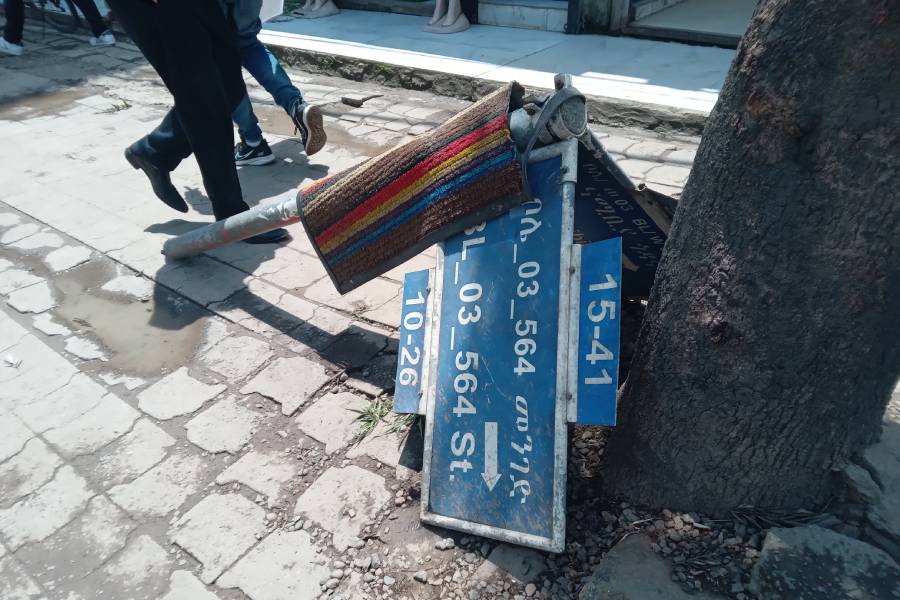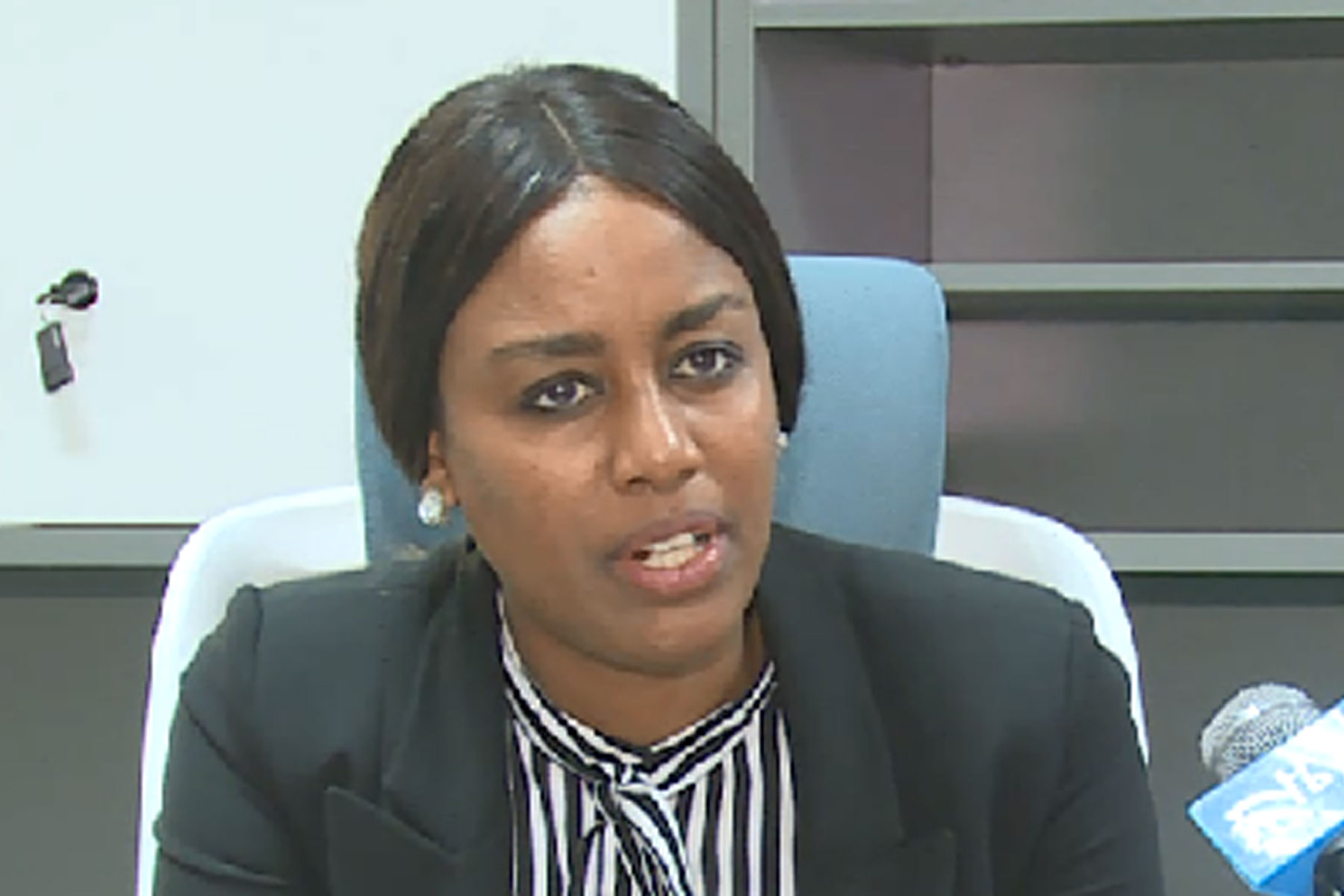
Radar | Oct 22,2022
For many who know him online and offline, Eyob Mihreteab was an intellectual, if for others a provocateur. All would agree that he was a person whose ideas and words echoed with clarity and force. In a digital age where social media has blurred the lines between the public and the personal, Eyob carved a space for himself that was as distinctive as it was uncompromising.
He was a man of contradictions, sharp yet humble, haughty yet sincerely generous.
Born and raised in the Gola Michael neighbourhood of Addis Abeba, Eyob was deeply rooted in his Ethiopian heritage but had a cosmopolitan outlook that stretched beyond national boundaries. His family hailed from Eritrea, and his understanding of Ethiopian and Eritrean political evolution shaped his views on the region’s most pressing issues. After attending Ethiopia Ermija and Zerfeshwal elementary schools, he completed his secondary education at Bole Senior Secondary School.
Eyob’s formal sociology education at Addis Abeba University was a foundation upon which he built his career and intellectual pursuits. A lover of debate and keenly critical of Ethiopia's federal system — he snobbishly referred to it as "monkey federalism" — Eyob’s ideas were sometimes controversial but always grounded in his own analysis. His criticisms of federalism, feminism, and the many "isms" sparked intense debate. He was, however, resolute in his convictions, stubborn not to entertain what he would see as baseless arguments.
Eyob's rise to prominence began in the digital sphere, where he wielded social media as a platform for expression and a tool for creating networks. Facebook, in particular, became his digital turf, where he cultivated a circle of friends, allies, and peers. In an age where the internet fuelled superficial connections, Eyob’s approach was one of curation, selecting carefully those he admired, and reaching out to those he respected. His social media posts were notable for their depth and structure. He used symbols like ‘¤’ and ‘∞’ to partition and compartmentalise his thoughts, crafting a distinctive, arresting, and inquisitively rigorous style.
Fitsum Demissie was among his circle of friends. He described Eyob as "a trigger point for most." His bold opinions and fearless expressions of controversial views invited heated reactions, yet there was no mistaking his brilliance. His online presence mirrored his intellectual inclinations: direct, unflinching, and unapologetic. Using the "block" button on Facebook became a hallmark of his online persona as he was least interested in half-hearted debates. He made it clear that engagement on his terms or not at all was the rule of the day. He was selective about his conversations, often quoting George Orwell’s Animal Farm: "Some people are more equal than others."
Avidly reading contemporary works, Eyob admired Ethiopian authors like Adam Reta and Bewketu Seyoum for their contributions to literature. His published work, "Che Belew," a collection of reflections on metropolitan life, solidified his position in Amharic literary circles. Eyob had once remarked that if he ever wrote another book, it would be "a departure from my previous style." His idea for the new book was to research profoundly and return with a "different colour and writing style," reflecting his continuous evolution as a thinker and writer.
Eyob’s research-based approach to writing and debate was evident in every aspect of his work, whether it was a digital post, a public debate, or an offline conversation.
A long-time friend, Dechasa Angecha, had admired Eyob’s writing from afar before they met. Eyob reached out, advised and helped him create a digital archive of his writings, a project that proved successful. When they met in person at a book fair, Dechasa was impressed. Eyob stood among literary figures who had endured imprisonment and torture for their words. But, when the crowd's attention was drawn to Eyob for autographs and selfies, his disappointment was profound.
Eyob respected hierarchy.
Deep-seated respect for his ageing father, a man he loved and admired, tempered his outspoken nature. Fearing the potential impact of his words on his father, Eyob chose a more subtle approach on matters that concerned his hometown. He enlisted his long-time friend to engage in a public debate, using him as a proxy to voice his criticisms.
"It was our secret," Dechasa revealed.
Eyob had a unique admiration for the Shoan political legacy, constantly referring to it in his writing as a symbol of power, ambition, and wisdom. He believed the country’s political discourse were driven by a battle between these forces, rooted in history, hierarchy, and pride.
Eyob was a person of principles, unyielding in his beliefs, whether in his social media posts, personal relationships, or public engagements. According to his friend Gemechu Merera, although Eyob could be blunt and sometimes difficult to agree with, his arguments were never without substance.
"He hated receiving unsolicited adivice but strived to bring out the best in his friends," Gemechu said.
Eyob's willingness to confront unconventional ideas also made him an invaluable mentor and connector. One of his noteworthy legacies was his ability to bring people together, whether through his work or personal networks.
“He was a connector," said Gemechu. "He brought people and ideas together.”
Eyob was always looking for ways to leverage connections, whether for intellectual pursuit or professional advancement. His pragmatic approach to networking was evident in his final venture, "The One Percent Club of Addis Abeba." With a tag line inspired by his favourite series "Game of Thrones," the club sought to create a brotherhood that could leverage their collective power for business and mutual gain. When discussing the project, Fitsum recalled how Eyob had never seemed so energised.
"He truly believed in what he was building," said Fistum. "A network of individuals who could wield influence in the corridors of business."
Eyob took solace in the quiet moments at home and quality time with friends. Misraq Ber was the spot where many came to hang out with him. Dechasa recalled the football match that Morocco won against Portugal. Although Eyob never understood the game of football, when everyone was celebrating, he was immersed in the cultural value of the moment, noting the joy of Moroccan mothers celebrating with their children on the field.
"He saw beyond the game," said Dechasa.
Despite his unyielding convictions and brash public persona, Eyob was not without vulnerability. His relationship with Tigist Alemayehu, which spanned 13 years provided another dimension. For Tigist, he was a person full of contradictions.
"He was passionate yet reserved, merciless in his critiques yet humble, arrogant yet generous," she said.
Eyob’s ability to engage with others was one of his most compelling traits. His friendship with Tewodros Tadesse, founder of X-hub, was one of mutual respect and understanding, even when their views on certain issues collided. He remembered Eyob visiting his office to learn about the entrepreneurial mindset, which later inspired him.
"He was both loved and infuriating," Tewodros recalled, "but he was willing to have calm, substantive conversations."
Eyob’s understanding of human nature, coupled with his desire to learn, made him a respected figure. His work in development and social programs, particularly in areas like HIV/AIDS and poverty reduction, demonstrated his commitment to effecting measurable changes. He also served as the editor-in-chief for "Awash YouTube" and "Hager Aman," using his platform to amplify voices and ideas he believed in.
His professed love for Ethiopia was foremost, and his passion for addressing urban issues led him to co-found "Sheneg," a project dedicated to understanding and addressing the problems Addis Abeba’s urban population faces. Eyob believed the city’s people had long been overlooked and exploited, and his work sought to change that. Eyob’s legacy is not confined to his writing or social media presence. His networks were about creating opportunities for those he believed in.
Natnael Afework, who has known Eyob for two years, is one such individual. Through their digital interactions, Natnael learned to value and support creative individuals striving to make their mark on the world, a lesson he attributed to Eyob's influence. Eyob appreciated talent and relentless hustle.
An entrepreneur, Dagem Worku, recalled that Eyob was one of the first to offer his support when he was starting out.
"His belief in reciprocal relationships of giving with the expectation of future return was central to his ethos," Dagem said. "That was his legacy."
The spirit of generosity, grounded in pragmatism, was one reason Eyob built such meaningful connections throughout his life.
His family history was steeped in personal and collective loss. The death of his brother four years ago created a deep emotional void that never fully healed. But the sudden passing of his closest friend, Minassie Aytenfisu, proved to be the final blow. Eyob’s health deteriorated rapidly following Minassie’s death, and he was eventually diagnosed with what physicians described as "broken heart syndrome." A month later, he passed away, sending shockwaves through his close-knit network of friends and colleagues.
Eyob's untimely passing on October 24, 2024, at the age of 44, has left a void not only in the lives of those who knew him in real life but also in the wider virtual circles he was known to steer effortlessly. He was laid to rest at St. Joseph Church, a site fitted for its reputation as a gathering place for rebels rather than conformists. It was an embodiment of the person he had been: someone who rejected society's norms, defied the easy route, and never shied away from controversy.
His friends would agree with the claim that "burial at Trinity Church would be for conformists, while Joseph is for rebels."
Eyob’s life was defined by contradictions—intellectually sharp yet emotionally sensitive, publicly outspoken yet privately vulnerable, deeply committed to his country yet critical of its systems. His influence extended far beyond his written works or social media presence. He knew how to connect people, leverage his networks for impact, and nurture intellectual growth in those around him.
PUBLISHED ON
Nov 09,2024 [ VOL
25 , NO
1280]

Radar | Oct 22,2022

In-Picture | Jul 08,2024

Fortune News | Aug 17,2025

Featured | Jul 20,2025

Fortune News | Apr 28,2024

Dec 22 , 2024 . By TIZITA SHEWAFERAW
Charged with transforming colossal state-owned enterprises into modern and competitiv...

Aug 18 , 2024 . By AKSAH ITALO
Although predictable Yonas Zerihun's job in the ride-hailing service is not immune to...

Jul 28 , 2024 . By TIZITA SHEWAFERAW
Unhabitual, perhaps too many, Samuel Gebreyohannes, 38, used to occasionally enjoy a couple of beers at breakfast. However, he recently swit...

Jul 13 , 2024 . By AKSAH ITALO
Investors who rely on tractors, trucks, and field vehicles for commuting, transporting commodities, and f...

Oct 25 , 2025
The regulatory machinery is on overdrive. In only two years, no fewer than 35 new pro...

Oct 18 , 2025
The political establishment, notably the ruling party and its top brass, has become p...

Oct 11 , 2025
Ladislas Farago, a roving Associated Press (AP) correspondent, arrived in Ethiopia in...

Oct 4 , 2025
Eyob Tekalegn (PhD) had been in the Governor's chair for only weeks when, on Septembe...